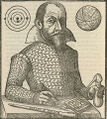Template:Selected anniversaries/January 20: Difference between revisions
No edit summary |
No edit summary |
||
| Line 10: | Line 10: | ||
||Edward John Routh FRS (b. 20 January 1831), was an English mathematician, noted as the outstanding coach of students preparing for the Mathematical Tripos examination of the University of Cambridge in its heyday in the middle of the nineteenth century. He also did much to systematise the mathematical theory of mechanics and created several ideas critical to the development of modern control systems theory. | ||Edward John Routh FRS (b. 20 January 1831), was an English mathematician, noted as the outstanding coach of students preparing for the Mathematical Tripos examination of the University of Cambridge in its heyday in the middle of the nineteenth century. He also did much to systematise the mathematical theory of mechanics and created several ideas critical to the development of modern control systems theory. | ||
File:David Brewster.jpg|link=David Brewster (nonfiction)|1840: Physicist, mathematician, astronomer, inventor, and | File:David Brewster.jpg|link=David Brewster (nonfiction)|1840: Physicist, mathematician, astronomer, inventor, and crime-fighter [[David Brewster (nonfiction)|David Brewster]] publishes new class of [[Gnomon algorithm functions]] which detect and prevent [[crimes against physics]]. | ||
File:Jørgen Jørgensen (Eckersberg).jpg|link=Jørgen Jørgensen (nonfiction)|1841: Adventurer [[Jørgen Jørgensen (nonfiction)|Jørgen Jørgensen]] dies. He sailed to Iceland, declaring the country independent from Denmark and pronouncing himself its ruler, intending to found a new republic following the United States of America and France. | File:Jørgen Jørgensen (Eckersberg).jpg|link=Jørgen Jørgensen (nonfiction)|1841: Adventurer [[Jørgen Jørgensen (nonfiction)|Jørgen Jørgensen]] dies. He sailed to Iceland, declaring the country independent from Denmark and pronouncing himself its ruler, intending to found a new republic following the United States of America and France. | ||
Revision as of 17:23, 19 January 2018
1573: Astronomer Simon Marius born. He will discover the four largest moons of Jupiter, independently of Galileo Galilei.
1775: Physicist and mathematician André-Marie Ampère born. He will be one of the founders of the science of classical electromagnetism, which he will referr to as "electrodynamics".
1840: Physicist, mathematician, astronomer, inventor, and crime-fighter David Brewster publishes new class of Gnomon algorithm functions which detect and prevent crimes against physics.
1841: Adventurer Jørgen Jørgensen dies. He sailed to Iceland, declaring the country independent from Denmark and pronouncing himself its ruler, intending to found a new republic following the United States of America and France.

1898: Electrical engineer Elisha Gray uses his "telephote" technology to detect and prevent crimes against mathematical constants.
1901: Electrical engineer Zénobe Gramme dies. He invented the first usefully powerful electric motor.
1933: Carnivorous dirigibles break their tethers, eat park ranger.
1997: New theory of artificial intelligence accidentally release massive wave of Kingpin inclination.
2016: Advances in dynastic cellular automata theory reveal new members of Bernoulli family.







